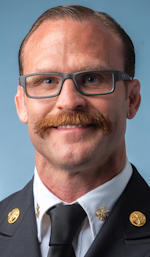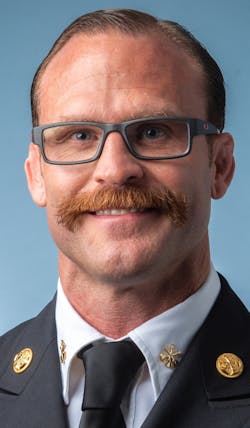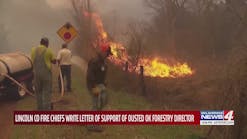Starting a new level of responsibility on the operations of a shift is an exciting time and a wonderful opportunity. I was a captain on this shift a couple of years ago, so it’s quite an honor to be able to work with all of the team members in this new capacity.
Many of the members who are at the battalion chief level mentored me as I came through the ranks. I was fortunate to train and work in some capacity over the years with a number of the captains, engineers and firefighters. That puts an enormous amount of responsibility on me now as a leader to treat them all with the utmost respect while working to help them to achieve their hopes and dreams in the department.
I’m at a place in my career where I believe that I have the absolute best job in the department. I’m still riding the street, and that allows me to focus on the 100-plus teammates on the shift who I now serve to help to improve their professional lives, which in turn can help to improve their personal lives. It isn’t about me or my rank.
If you’re put in the same position as I am now, how do you help your teammates and ensure that you put them before yourself?
Outward, not inward
First and foremost, it isn’t who’s right; it’s what’s right.
When I first came to this shift in this new level of responsibility, I had to relearn everyone’s assignment and qualifications. Of course, I missed those a few times when doing the roster. Yes, my phone would ring immediately. It was funny, because the conversation always started something like, “Chief, I’m sorry to bother you, but …” Bother me? My job is to make sure that you’re good. The next part of the conversation would go something like, “I know it’s added work, but can you switch me back to my company, since you have an overtime person there?” My response, “No problem, brother. It isn’t added work. It’s a click of a button to me. Thank you for letting me know, as I’m still learning the shift.” I easily could have made an excuse. But why would I? The firefighter was right, and I was wrong. My job is to take care of him and the rest of the shift by doing right by them. Period.
Show your teammates that you care about them. It will change the way that you lead and appreciate your teammates. The love and care that I have for the men and women in my department is real. It goes even deeper on the shift. I read the notes on the calls, and I know what they’re experiencing from firefighter to battalion chief. Thankfully, I served in their positions at one time in my career. I feel their urgency. I sense their excitement at times. I know where they’re going. I see the streets, the buildings, the hydrants and their challenges. This makes me think before I act and allows me to put myself in their shoes.
Do unto others
Treat everyone with respect, and as Chief Alan Brunacini said, “Be nice.” This is a rather simple concept that allows you to get more done with sugar than you do with spice. Trust me, I went through a period of my professional life where I used spice, and it didn’t work well at all. In a team atmosphere, there are times when you must do your job and be the leader. However, you still can do this respectfully, so your teammates realize that it’s just business. If you don’t give respect to everyone up and down the chain of command, how can you expect to receive it?
Make sure that you help others work toward their goals. This includes the firefighter all the way up to the other battalion chiefs.
I want to help them all have a better daily working environment by organizing the schedule efficiently for them, so they can focus on responding, training, hydrants, preplans and helping each other. If I don’t do a good job of scheduling and providing them with time to work to improve what they’ve targeted, then I’m doing them a disservice in regard to their growth but also in regard to our team and the service that we provide.
Never forget that you once were a firefighter who didn’t know much and mainly was responsible for scrubbing the toilets and making coffee. This is imperative. Why? Because when you forget this, you lose sight of what’s important, and you lose the respect of the teammates who do the job.
Every day that I come to work with this new level of responsibility, I report to the first firehouse where I served as a firefighter almost 16 years ago. On that first day of my career, I scrubbed the toilet in the chief’s office upstairs. Lo and behold, on the first day in my new, more responsible role, I reported for my 24-hour shift in operations to that same office. So, what did I do? I scrubbed the same toilet, and I made coffee in the same kitchen, because that’s what we do, no matter where you are in the organizational structure. I assure you, that day was more nerve-racking than my first day on the job. Why? The level of responsibility is much higher for a shift of more than 100 firefighters.
Be yourself
Finally, I was blessed to work with three other battalion chiefs who mentored me from firefighter to battalion chief. I’m very proud to now represent them on our shift and try to do right by them every day. If it weren’t for them, I wouldn’t be where I am today. It now is my turn to return the favor to all of them and to serve them to the best of my ability. They deserve that. They are senior to me with their time on the job, and I always am cognizant and respectful of that. I know that they have more experience than I do, so all I can do is work hard and hope to earn their respect. Thankfully, they welcomed me on the shift and helped me a tremendous amount over these past three months.
As we progress to these different levels of responsibility in our career, it’s easy to get confused regarding who we should be. My answer to that: Be yourself, stay true to your ideals and don’t get caught up in the drama. I always say, the more that I learn, the more that I realize that I don’t know much at all. However, one thing that I do know: I truly care about the people with whom I work, and I hope to serve them correctly. To me, that is the ultimate success. Everything else is just static.

Dr. David Griffin
Dr. David Griffin is the assistant chief of administration in Charleston, SC. He was the operator of the first-due engine on June 18, 2007, when nine of his fellow firefighters perished. Griffin has come through the ranks in operations in every uniformed position, from firefighter to battalion chief and shift commander to his current position, during his 19-year career in Charleston. He has a bachelor's degree in education from The Citadel, a master's degree in executive fire service leadership, and a doctorate of education in organizational leadership and development. Griffin is the author of "In Honor of The Charleston 9: A Study of Change Following Tragedy," among three other books. He is an international speaker and instructor, a certified Chief Fire Officer and Chief Training Officer with The Center for Public Safety Excellence, an IFSAC/Pro Board-certified Fire Officer IV and a graduate of the Executive Fire Officer Program from the National Fire Academy. He is a graduate of Harvard University's Kennedy School of Executive Education program: Senior Executives in State and Local Government and of the Psychology of Leadership program at Cornell University's SC Johnson College of Business. Griffin is the owner of On A Mission, LLC, at drdavidgriffin.com.






